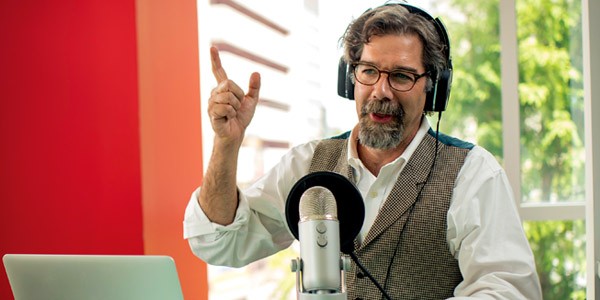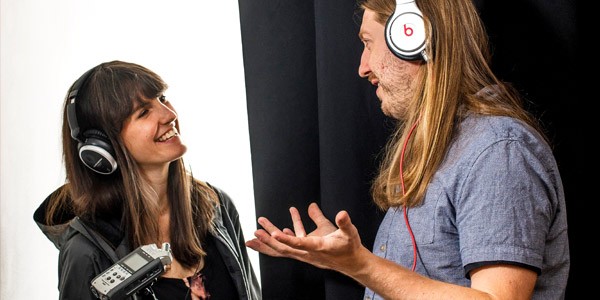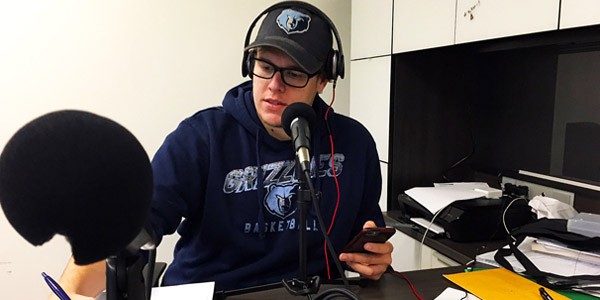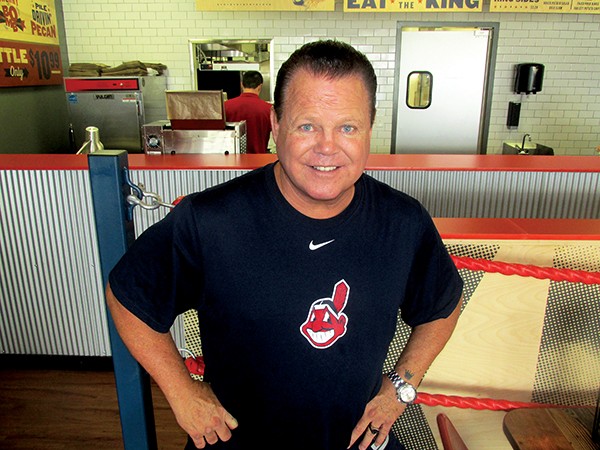Podcasts are having a moment. Well, they’ve been having a moment. And, these days, it seems everyone has one.
Shaq has a podcast. Jay and Silent Bob have one. Snoop Dogg has one.
Paula Deen (remember her?) has one. Neil deGrasse Tyson has one. So do Goldman Sachs, GE, Netflix, and eBay.
Right there on your phone or laptop or car radio you can hear shows about film, music, comic books, art, finance, history, UFOs, technology, current events, Donald Trump — name the subject, and there’s a podcast (or six) about it. And you can hear most of them for free.
But podcasting has been around a long time. It’s so old that the word itself is a portmanteau of “broadcast” and “iPod” (remember those?). The word was coined around 2004, when some of the first podcasts were being produced on a consistent basis. Apple included support for podcasts in iTunes 4.9 in 2005, so users didn’t have to download the shows and then port them to their mobile devices. They were just … there. Soon thereafter, radio companies began to flow their content on the iTunes platform, and the medium took off.
Podcasts’ recent rise is credited largely to Serial. The true crime show was downloaded 10 million times in the seven weeks after its debut. And its follow-up, S-Town, shattered that record. Both shows brought millions to the podcasting medium.
Though more than half of the country (60 percent) knows the word “podcasting,” only 40 percent of Americans have ever listened to one, according to new data from Edison Research. Those who listen regularly are mostly educated males with a good, full-time job, according to Edison. Even still, most podcast listeners said they don’t listen on a regular basis.
But, while podcasts are having a moment, they also have a bright future. Podcast ad revenues have grown by 85 percent since this time last year, according to a new report from the Interactive Advertising Bureau and PricewaterhouseCoopers. And that figure is on track to reach more than $220 million this year. For this, an IAB executive said the podcast landscape will continue to grow mainstream.
The podcasting universe has historically been populated with independent producers making independent shows about whatever in the hell they found interesting. They’d chronicle their own lives, or talk sports, or just talk with friends while they played party games. (See the OAM Network section of the story below.)
There are now dozens of podcasts in Memphis — about sports, music, social media, bikes, fitness, insults, creativity, and, perhaps not surprisingly, there are a ton of shows about church and religion.
Welcome to Night Vale, one of the most successful podcasts of all time, is slated for a live performance Tuesday, July 11th, at the Germantown Performing Arts Center. Also, look for the newly re-launched Memphis Flyer podcast out now on memphisflyer.com, iTunes, or wherever you find podcasts.
For this issue, we found some of the city’s most interesting podcasts and talked to the creative, hard-working people behind them. Even so, we certainly couldn’t cover every show in Memphis, which is a great problem to have. We fully expect, though, that many, many more creative Memphians will find their ways to the medium, slap on some headphones, slide behind a microphone, hit record, and broadcast our city to the digital masses. — Toby Sells
OAM NETWORK
Podcasts, like everything else, provide endless possibilities. That’s the way Gil Worth sees it.
“I don’t know if it’s my dumb creative brain, but I have to think about podcasts as more than just [radio on demand],” he says. “They can be anything.”
His OAM Network proves it. Scroll through the list of shows at the Memphis-based, independently owned and operated podcast network, and you’ll find shows about social justice, bikes, games, current events, and being a black nerd in Memphis.
Worth started the network in 2012, and while it has 10 separate shows on the air now, the OAM vault has 20 shows which aren’t “live” anymore but can be accessed anytime.
Burned out on years of playing music, Worth discovered podcasts. He had recording equipment and time and thought, “Maybe I could do one of these.” He did. It was a variety show with interviews, discussion, and games. Did anybody listen?
“Probably not, no,” Worth says.
But he enjoyed the process and kept going. Others started asking him how he did it, and he offered them his help. Then, he formed the OAM Network (OAM is an acronym for the first letters of his children’s names: Owen, Adia, and Mia).
The network will soon move to a brand-new studio in Crosstown Concourse. Church Health partnered with the OAM Network and Forever Ready, a video production company, to house both organizations in a big, glass booth on the ground floor of the building, there for all to watch.
While podcasts are, indeed, having a moment, Worth hopes that moment lasts a long time. “It’s almost like my mission statement,” Worth says. “Is it going to last, or did I make terrible decisions? Ah, you should’ve stayed in school, Gil.” — TS
 Justin Fox Burks
Justin Fox Burks
Southern Hollows
SOUTHERN HOLLOWS
Stinson Liles’ new history podcast Southern Hollows peddles in the grim and the inhumane — all of it a particularly Southern shame: a man is set on fire, babies are stolen, a mob breaks into a prison, a town is flushed of its black citizens.
One could argue that it makes all the sense in the world that this masterfully done podcast with its focus on long-ago bad deeds done south of the Mason-Dixon line is a result of current events.
“Right up to the election, I was listening to a lot of current events podcasts, and I kind of burned out on them. I needed to take some time for myself,” Liles explains. “That’s when I found myself listening to more and more humanities, storytelling, and history. That’s when I got this idea together.”
Liles had a vision: a single-voiced, little-known history story, one with a moral that didn’t have to be spoon fed to the audience. That “hollows” angle intrigued Liles.
“Given where we are in the world, I’m really interested in the history we intentionally mislead ourselves on,” he says. “I just thought there was a real opportunity, and maybe even coming from the voice of a Southerner to, you know, own up to a lot of this stuff. I think we’re really conflicted as Southerners in a lot of ways because everyone needs lore, family lore, regional lore.
“When it’s conflicted like that, it’s hard to separate ‘how can I love old grandpappy but find the history of my entire surroundings an abomination?'”
Southern Hollows is now four episodes into its first 12-episode season, with each episode averaging about 1,000 downloads. Liles had hoped to release episodes every other week, but stuff (like straight-line winds) got in the way. He was also worried that he wouldn’t have enough ideas for season two, but his notepad is filled. — Susan Ellis
BLACK NERD POWER
Richard Douglas Jones is one of the funniest people in Memphis. He’s the new host of the P&H Cafe’s popular Thursday night open mic, and Patton Oswalt has personally asked him to be his opening act twice.
Jones is also the creator and co-host of the Black Nerd Power (BNP) podcast, and its corollary stand-up showcase the Black Nerd Power Comedy Hour. Both were developed, in part, as a response to the isolation he felt as an African-American comedian and media consumer who wasn’t all that into the Def Comedy Jam model. He liked comic books, and science fiction, and animation, and video games, and — you know — nerd stuff.
“You can be a nerd about anything,” Jones says, and BNP proves it by addressing obvious topics like superheroes, less obvious topics like romance novels, and completely unexpected topics like office supplies. “People completely nerd-out over office supplies,” he says before nerding out over his favorite office supplies. “You get people talking about pens, and pencils, and stationary, and you can just see their nips protruding through their shirts.”
While touring America as a comic, Jones came to feel less alone, finding more folks like himself. Within their home comedy scenes, they were what Jones described as “the only Klingons on the Enterprise.” So Black Nerd Power became like a very funny message in a bottle — written in Klingon. Its theme: “You are not alone.”
“My plan right now is to evolve the podcast into a live show,” says Jones, whose guests have included comedians like Paul Mooney, David Alan Greer, and John Witherspoon.
On the nerd front, Jones takes a controversial position on Wonder Woman, giving the film two thumbs down and describing it as “Captain America set during WWI.” He’s excited about Spider-Man: Homecoming and Black Panther. He wants others who thought Aisha Hinds was sexy in her performance as Harriet Tubman on the TV series Underground to know it’s okay to feel that way.
“Harriet was a powerful woman,” he says. “And power is sexy.”
Black Nerd Power has broadcast 140 episodes. They are all archived and available at the OAM network. — Chris Davis
NEIGHBORHOOD CONNECT
“It’s going to be the bomb-diggity.”
That’s a phrase you’ll often hear from Joyce Cox, co-host of the Neighborhood Connect podcast from the city of Memphis’ Department of Housing and Community Development (HCD).
Cox, HCD’s manager of communication and civic engagement, hosts the show along with HCD director Paul Young. He says the show is designed to create a platform for the city to communicate happenings and efforts made in various neighborhoods, as well as be a medium for members of the community to talk about the initiatives, opportunities, and obstacles in their neighborhoods.
“We [HCD] want to continue to be involved in larger projects, but our focus is on neighborhoods,” Young says. “The lifeblood of the city comes from the neighborhoods, and we want to elevate things happening in them.”
There have been six episodes of the podcast to date, with topics ranging from urban art to home ownership to removing blight to more complicated topics, including how HCD is funded.
“We give insight to different things in different ways,” Young says. “It’s a lot easier when you are listening to someone explain something.”
The show has had around 4,500 downloads since its inception last November. Although listeners tripled in the spring, Young says one of the biggest challenges in getting more listeners so far is the podcast’s irregular schedule.
Over the next month, Young says the goal is to “freshen up” the podcast and increase listener rates. One way he plans to do this is by incorporating and engaging more youth with topics ranging from struggles common among young people to opportunities for youth and crime rates in their generation.
“Most neighborhood leaders aren’t young people,” Young says. “So we want to give the youth a space that allows them to have their voices heard.” — Maya Smith
Neighborhood Connect can be found on iTunes or Stitches.
 Justin Fox Burks
Justin Fox Burks
Sonosphere
SONOSPHERE
Amy Schaftlein, who produces the Sonsphere podcast with Christopher Williams and engineer Zach Losher, attributes the current boom in podcasting to its ease of use.
“The medium is just so convenient,” Schaftlein says. “It’s like the DVR of radio. You can put it on your list, and if you are about to go on a long car ride or a long walk or something, you can just put it on.”
Sonsophere is “an exploration of sound in music and art movements through history.” Williams saw the word in the book Sound in the Margins and thought it was perfect for the show.
“It encompasses our tagline,” Williams says. “The ‘sounds all around you.'”
Schaftlein and Williams began Sonosphere in August 2015, with a show about Detroit-based industrial noise band Wolf Eyes but quickly found themselves headed down a research rabbit hole.
“I approached the podcast from a place of curiosity,” Schaftlein says. “How did we get from classical music to electronic noise?”
Even though the abstract music covered by Sonsosphere isn’t burning up the charts, these musicians’ theories and experiments have had a lasting impact on hip-hop, rock, and EDM. Much of the podcast’s audience is listening in Europe, such as the Vienna experimental music collective, which recently sent thanks for inspiration.
“Most of the podcasts in Memphis are Memphis-specific,” says Losher. “I like this, because is it Memphis-based but it has international appeal.” — Chris McCoy

You Like Hoops?
YOU LIKE HOOPS?
Chase Lucas hosts a podcast that is ostensibly about sports but is really about life, Memphis, and what it means to be a fan of something.
You Like Hoops? is available on the GBB Live feed, the podcast of Grizzlies blog Grizzly Bear Blues. Since launching the show in February (full disclosure: I was a guest on episode 4), Lucas has taken the conversational format of many podcasts and applied it to a field more driven by talking about stats and scores.
What makes You Like Hoops? such a breath of fresh air in the sports vertical (where everyone has a hot take about everything usually just for the sake of having an opinion) is that its roots aren’t really in sports media at all, but other shows Lucas enjoyed.
“You Made it Weird with Pete Holmes is a wide-ranging, in-depth conversation where you come away feeling like you really know the guest,” Lucas says. And it’s not just the format, but the method of production as well: “[Holmes] always records in-person, which I attempt to do whenever possible.”
Because Lucas has done the same, the format lends itself to an intimacy in the conversation that isn’t the norm among sportswriters. There’s no sense of the hosts and guests as personae — they’re just people talking.
NBA culture is an odd, precious thing. It’s maybe the only community left on Twitter that’s still driven by enthusiasts watching and discussing something they enjoy as it happens.
“I wanted to try a spin on that but within this crazy basketball culture that exists so far outside of what happens during the actual games,” Lucas says. — Kevin Lipe
www.grizzlybearblues.com/you-like-hoops-podcast
 Michael Donahue
Michael Donahue
Dinner With the King
DINNER WITH THE KING
Hosting his podcast, Dinner with the King, each Wednesday on Pod Avenue is a natural for Jerry “The King” Lawler.
He wanted to be a disc jockey before he decided to become a professional wrestler. In the late ’60s Lawler entered some of his drawings and won second place in a WMPS radio contest. But it was radio announcer, Scott Shannon, who made him want to become a deejay. Lawler was at the awards ceremony at Southland Mall.
“Scott comes out and he’s got on almost like a white jumpsuit like Elvis,” he says. “It’s open up all the way down. No shirt. He’s got a white scarf around his neck. And he’s got this long, long blonde hair and everything. Like a rock star.
“All the girls went crazy. They started screaming. Right then at that point I said, ‘That’s what I want to be. A radio deejay.'”
Shannon invited Lawler to the station. He asked him to draw weekly Scott Shannon caricatures for the station’s Top 10 records flyer. Lawler told Shannon he’d love to try to be a deejay. Shannon helped Lawler put together a demo tape, and Lawler got a job as a deejay at WMQM.
When he was asked to host a podcast, Lawler said he’d do it as long as he didn’t have to feature guests each week.
“They said, ‘You don’t need to have a guest,'” Lawler says. “‘Just do it yourself. You just go on and talk every week. Tell about what you’ve done, and tell old stories from Memphis wrestling.'”
Lawler and cohost Glenn Moore have done 16 episodes, which can be found at podavenue.com/king as well as iTunes, Sticher, Google Play and other podcast apps.
“We are close to 800,000 downloads so far,” he said. — Michael Donahue